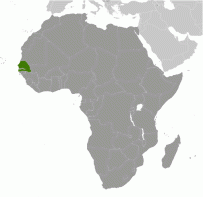 Hello all! For those who don’t know, I am heading out this Wednesday for a nine month Fulbright research fellowship in Senegal. The Fulbright Program is sponsored by the U.S. State Department and dates back to the post-World War II era. It sponsors early career researchers, mid-career researchers, and English Teaching Assistants (ETAs) to work and live in over 140 countries around the world. The program aims to promote intercultural exchange and communication between the United States and its partner countries.
Hello all! For those who don’t know, I am heading out this Wednesday for a nine month Fulbright research fellowship in Senegal. The Fulbright Program is sponsored by the U.S. State Department and dates back to the post-World War II era. It sponsors early career researchers, mid-career researchers, and English Teaching Assistants (ETAs) to work and live in over 140 countries around the world. The program aims to promote intercultural exchange and communication between the United States and its partner countries.
I am one of three student researchers who will be in Senegal during the 2016-17 period (along with 8 ETAs), which means I am one of the recipients of a grant for researchers at the beginning of their careers. My grant is not a degree-seeking fellowship, but I’m hoping to continue studying migration and development in grad school and in my future professional life. The project builds on previous research I worked on as a part of a Mentored Advanced Project, Grinnell’s equivalent of an undergraduate thesis. I am eternally grateful to everyone who supported and helped me at Grinnell during my MAP research and Fulbright application process. If anyone is considering applying for a Fulbright, let me know and I am happy to answer any questions about the application process or my own application.
My Fulbright project focuses on the impact of transnational migrant-led development projects on rural communities, with a particular emphasis on how these development efforts ha ve impacted public goods and quality of life over time. In non-academic terms, I will be interviewing individuals in rural regions of Senegal to learn about the money/projects (the construction of schools, wells, health centers, etc.) sent/funded by their family members living abroad and how this income actually affects their quality of life. I’m also interested in the influence of changing European migration policy on migrants’ ability to do development in their home communities. I’ll be dividing my time between Dakar (Senegal’s capital) and rural regions, spending the first two months or so with a host family in Dakar.
ve impacted public goods and quality of life over time. In non-academic terms, I will be interviewing individuals in rural regions of Senegal to learn about the money/projects (the construction of schools, wells, health centers, etc.) sent/funded by their family members living abroad and how this income actually affects their quality of life. I’m also interested in the influence of changing European migration policy on migrants’ ability to do development in their home communities. I’ll be dividing my time between Dakar (Senegal’s capital) and rural regions, spending the first two months or so with a host family in Dakar.
 For those who don’t know, Senegal is a small West African country located on the Atlantic Coast. The entire country has a population of around 13.5 million, with the Dakar metro area home to over 2 million. The official language is French, but most people speak Wolof or another Senegalese language at home. Over 90% of Senegalese are Muslim. Senegal is home to a diverse range of ethnic groups, cultural practices, and climates. If you are interested in learning more about Senegal, I highly recommend Pierre Thiam‘s cookbooks (especially this one), Moussa Touré’s film La pirogue, or the Senegal episode of Anthony Bourdain: Parts Unknown.
For those who don’t know, Senegal is a small West African country located on the Atlantic Coast. The entire country has a population of around 13.5 million, with the Dakar metro area home to over 2 million. The official language is French, but most people speak Wolof or another Senegalese language at home. Over 90% of Senegalese are Muslim. Senegal is home to a diverse range of ethnic groups, cultural practices, and climates. If you are interested in learning more about Senegal, I highly recommend Pierre Thiam‘s cookbooks (especially this one), Moussa Touré’s film La pirogue, or the Senegal episode of Anthony Bourdain: Parts Unknown.
After over 2 years of studying West African politics and migration, I am beyond excited to set off on this journey and actually move to West Africa! I’d love to hear from friends and family while I’m in Senegal and will be happy to give you my mailing address when I arrive. Thanks for reading!

You go girl
LikeLiked by 1 person
looking forward to following your year
LikeLike
Thanks for reading Uncle Joe! I hope all is well with you (:
LikeLike